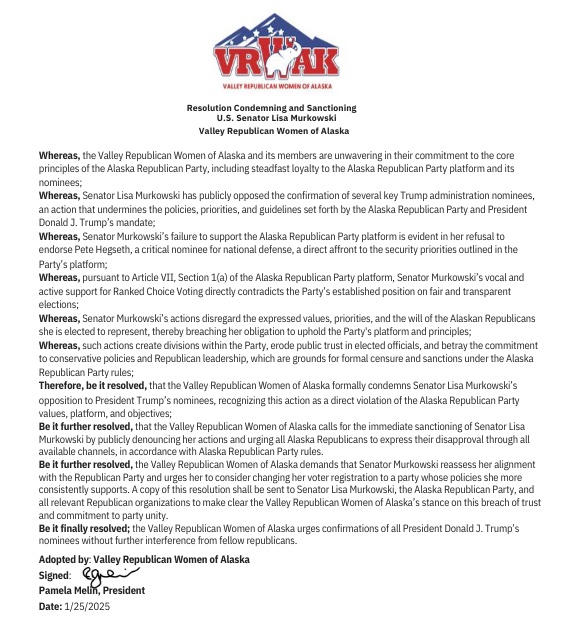The filing for the April 1 Anchorage municipal election closed Friday. Ballots will be mailed to qualified (and unqualified) Anchorage voters at least 21 days before Election Day. Anchorage executes its elections with mail-in ballots, which can also be dropped off at any of the 18 ballot drop-boxes around the city. More information is available at the Municipal Election Office website.
The candidates who made the deadline are:
Anchorage Assembly Candidates
District 1 – Seat L – North Anchorage
Volland, Daniel – Filed 1/14/2025
Danger, Nicholas – Filed 1/10/2025
George, Daniel – Filed 1/24/2025
District 2 – Seat A – Chugiak, Eagle River, JBER
Walker, Kyle – Filed 1/23/2025
Littleton, David – Filed 1/24/2025
Goecker, Jared – Filed 1/10/2025
District 3 – Seat D – West Anchorage
Perez-Verdia, Kameron – Filed 1/13/2025
Duckworth, Jonathan – Filed 1/10/2025
Steen, Amie – Filed 1/24/2025
District 4 – Seat F – Midtown Anchorage
Day, Erin Baldwin – Filed 1/16/2025
Alleva, Annette LaMarche – Filed 1/24/2025
Smith, Don – Filed 1/23/2025
District 5 – S eat H – East Anchorage
Frank, Angela – Filed 1/16/2025, Updated 1/24/2025
Stiegele, John – Filed 1/24/2025
Silvers, Yarrow – Filed 1/13/2025
District 6 – Seat J – South Anchorage, Girdwood, Turnagain Arm
Colbry, Darin – Filed 1/14/2025
McCormick, Keith – Filed 1/15/2025, Updated 1/16/2025
Anchorage School Board Candidates
School Board – Seat A
Bellamy, Margo – Filed 1/13/2025
Rosales, Alexander – Filed 1/13/2025, Updated 1/17/2025
School Board – Seat B
Cox, Mark Anthony – Filed 1/10/2025
Lessens, Kelly – Filed 1/10/2025
Service Area Board of Supervisors
Bear Valley LRSA – Seat B
Birch Tree/Elmore LRSA – Seat C
Sell, Scott O. – Filed 1/14/2025
Chugiak Fire Service Area – Seat C
Stoltze, Bill – Filed 1/16/2025
Girdwood Valley Service Area – Seat C
Okonek, Kellie – Filed 1/22/2025
Wilbanks, Brett – Filed 1/21/2025
Glen Alps Service Area – Seat C
Spadafore, Mason Ryder – Filed 1/15/2025
Glen Alps Service Area – Seat D
Marks, Roger – Filed 1/14/2025
Homestead LRSA – Seat A
Parret, David – Filed 1/24/2025
Lakehill LRSA – Seat A
Mt. Park Estates LRSA – Seat C
Redlinger, Bob – Filed 1/14/2025
Mt. Park/Robin Hill RRSA – Seat E
Leary, Collin – Filed 1/10/2025
Paradise Valley South LRSA – Seat A
Rabbit Creek View/Heights LRSA – Seat C
Steffens, Claire – Filed 1/24/2025
Raven Woods/Bubbling Brook LRSA – Seat C
Rockhill LRSA – Seat C
Section 6/Campbell Airstrip Road LRSA – Seat D
Brown, Lonnie – Filed 1/10/2025
Section 6/Campbell Airstrip Road LRSA – Seat E
Trueblood, Ted B – Filed 1/16/2025
Sequoia Estates LRSA – Seat C
Sequoia Estates LRSA – Seat D
Mikko, Dagmar – 1/21/2025
Skyranch Estates LRSA – Seat C
Rickman, Ron – Filed 1/15/2025
South Goldenview RRSA – Seat D
Hughes, Chris – Filed 1/10/2025
South Goldenview RRSA – Seat E
Reynolds, Chris – Filed 1/20/2025
SRW Homeowners’ LRSA – Seat B
Talus West LRSA – Seat C
Jorgensen, Lawrence – Filed 1/22/2025
Totem LRSA – Seat A
Jensen, David – Filed 1/17/2025
Upper Grover LRSA – Seat C
Dwiggins, Leon – Filed 1/20/2025
Upper O’Malley LRSA – Seat C
Pease, David – Filed 1/10/2025
Upper O’Malley LRSA –Seat D
Valli Vue Estates LRSA – Seat C
Hippler, Allen – Filed 1/22/2025
Villages Scenic Parkway LRSA – Seat B
Shearer, Greg – Filed 1/10/2025










